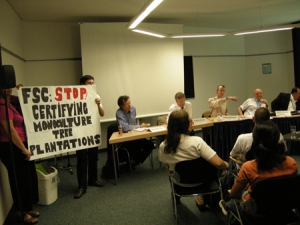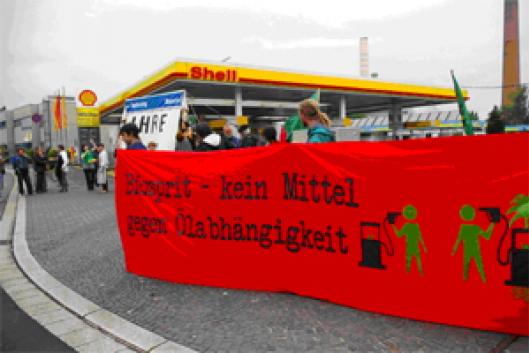By then it seemed that the world’s governments had become aware of the Earth’s looming future in case biodiversity loss under deforestation, biopiracy, agribusiness expansion, and so on, remained unchanged. So a mechanism –the CBD-- was put in motion, gathering every two years in high-level summits paralleled by civil society organization’s events. The CBD managed to resist corporate contamination a bit more than other fora (e.g. the Convention on Climate Change). However, little by little it has been increasingly hijacked by the industry’s agenda until it has become a string of protracted sessions where documents full of brackets are delayed waiting for lobbies clinching their deals on issues that have direct impacts on peoples’ present and future lives. Over and over again social organizations have tried to make a breach in the wall participating in the spaces granted to them within the process. However, real effects at policy and implementation level have been few. As a result, they have tried to make their way and insufflate true people’s problems, worries, dreams --true people’s lives-- into the CBD. And they have done so through imagination, participation, humour and –why not?,- even anger. Here follows a brief overview of some of the actions carried out at the current 9th Conference of the Parties (COP9) to the CBD, taking place in Bonn. Sunday May 18 Around 60 people protested against the large scale cultivation of crops for energy --which is disastrous for food supply and causes deforestation— as a way of dealing with global warming. So far, the honest conclusion that a radical reduction of energy use is needed mainly in ‘the West’ is ignored by the mainstream media and policy makers. At two petrol stations car drivers had to make a choice: 'petrol' to the right, 'food' to the left. Banners were stating "agrofuels, no solution for oil addiction." Most drivers had some sympathy for the action but wanted to fill up petrol anyway this time. The worker in the Shell station was furious about the counter information in front of her petrol station and called the police. After some discussions the action was allowed, although drivers had to be given more possibilities to go around the 'gate of choice'. After two hours the group started to move again for a short demonstration ending on a field with a picnic with healthy and local food, as it is still possible. |
|||
| Amongst the activists were many people from Via Campesina, the international network of small farmers. For them and the millions they represent, the large scale introduction of agrofuels is a direct danger for their livelihoods and life. | |||
| Thursday May 22 UN Biodiversity Day … or let’s say the International Profitdiversity Day
A lunch-meeting was organised by the International Chamber of Commerce, the lobby organisation of the world’s largest corporations. Their meeting was interrupted by the visit of a peculiar group of “happy shareholders” who celebrated agribusiness monopolies and congratulated industry for destroying agricultural biodiversity, all of which made possible their high profits. They ended making a toast to the Purveyors of the (Gan)Green Revolution! Part of their speech: "We, 'The Small Shareholders Initiative', TSSI are very glad about the important issues we have to report on behalf of the International Profitdiversity Day today:- Business gets 220.000 US $ to support companies in their work at the CBD. This means that we can give our profits to the shareholders and still make people believe that we work for biodiversity. |
|||
| - During the high level meeting Thursday May 29, business rightly gets a full hour to present its ideas. All other stakeholders together have to share the other hour. Afterwards all delegates are invited, as part of the official programme, by business for a lunch. Another possibility is to make the delegations do what we want.
Hear hear!" |
 |
||
| Thursday May 22 Nature for People, Not for Business!
Activists from all over the world hang a banner, banged on teacups and handed out Via Campesina messages during the official celebrations of Biodiversity Day, at the end of a message by UN secretary general Ban Ki Moon to the delegates of the Convention.Given that agrobusiness dominates the present global food trade with a Green Revolution package that destroys bio and agrodiversity, the banners read "No Agrodiversity Without Farmers" and "Nature for People Not for Business". After a few minutes the banners were taken away by UN police officers and officials and the people holding them were escorted out of the Maritim Hotel, and lost their accreditation badges, which are required to participate in the meetings. However, members of Via Campesina were given a round of applause from many government delegates when they chanted "nature for people, not for business". The message was that no solution can come from such production model. Instead, it is rural communities who are the key to both the solution to world hunger and the safeguarding of the world's biodiversity. |
|||
| They have the ability to feed the world promoting food diversity, sustaining traditional cultures and not burdening the environment. Moreover, small-scale, local and ecological production is an effective and immediate way of reducing carbon emissions and cooling down the planet. |  |
||
| Friday May 24 Plantations are not Forests!
The German Forestry Council organized an event for forest and timber industry representatives.The usual pro-market, utilitarian approach to forests speech made no distinction between forests and plantations, and in fact was illustrated with pictures of monoculture tree plantations, described as forests. The use and marketing of forests was presented as a climate friendly strategy, with much attention on the carbon sequestering capacity of forests. The presentation ended with an emotional “plea” to utilize wood resources, illustrated by an image of a sculpture, the “wooden man” and followed by a violin concert, and the point was then made that “even violins” are made out of wood. After the presentation there was a reception. On the spur of the moment, a group of five women quickly put together a strategy for presenting their views: as guests were enjoying drinks and appetizers, they captured their attention, then took turns, each for a very brief statement, to speak on the dangers of GE trees, on the failure of plantations to support goals of mitigating climate change and protecting biodiversity and on the impact of monoculture tree plantations on soils, waterways and people in Brazil and Uruguay, as well as the situation of European forests, pointing out their long history of exploitation and the concomitant loss of biodiversity. |
|||
| A small group of people stomped out of the room apparently angry at their interruption, but overall their small action was well received by the guests who clapped and mostly nodded in apparent agreement. One more opportunity taken to speak out against the monoculture mentality. |  |
||
| Tuesday May 27 A Call for a Ban on GE Trees
A tree planting ceremony was being held outside the meeting of the CBD. A large number of activists participated, some mimicking Genetically Engineered frankentrees that attempted to invade the CBD while others stopping and chopping them down before they could succeed.The tree planting ceremony was symbolic of what industry is pushing--non-native, often invasive trees for monoculture timber plantations. GE trees will mean more plantations and an even greater threat. |
|||
| A ban on the release of genetically engineered trees into the environment is supported by African delegates plus numerous Parties from Asia and Latin America. It was discussed at length during the first week of the Biodiversity Convention and will now move into the High Level Session where Ministers from around the world will decide what will happen with this issue. |  |
||
| Wednesday May 28 FSC: Stop Certifying Monoculture Tree Plantations
Activists from social movements attended a side event organized by the Forest Stewardship Council (FSC). Holding a banner, they stated their concern about FSC's approach, that has ignored the dramatic evidence provided by social and environmental movements from around the world regarding the harmful impacts of tree plantations, which has allowed millions of hectares of monoculture tree plantations to be falsely certified as "forests".During the side event a statement was read in which they expressed that apart from having to confront governments and corporations, local communities struggling against large-scale monoculture tree plantations must face the additional problem posed by the fact that these same plantations are being given credibility through certification by the FSC. Yet, the credibility of FSC is increasingly undermined by certification of these and other destructive projects. After a couple of questions and a short discussion, FSC closed the meeting, although several more people wanted to ask questions and some pointed out that this should be a democratic space for discussing the problems with FSC. Their claim was: Plantations are not forests and FSC should not certify them! FSC should STOP being a tool for corporate interests! |
|||

Reports based on information from: Global Forest Coalition, http://www.globalforestcoalition.org Photo courtesy: Global Forest Coalition and Global Justice Ecology Project |
|||
Issues: International Forest Policies
Languages:
Image

|